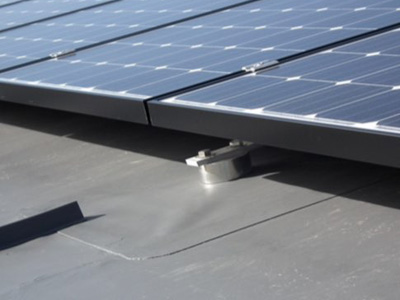Therefore there is no affect on array efficiency over a given rooftop space or given ground space.
Flatrooftop solar panels array horizontal.
A solar panel mount or solar racking system is the foundation that holds your solar array in place.
Some degree of tilt 3 to 4 degrees is best able to help keep solar panels clean when it rains.
If solar resources are adequate the solar assessor shall designate the location of future proposed pv arrays and solar thermal panels.
This is because it s based on the average position of the sun over your property.
During solar system installation that panel orientation be vertical or horizontal is all acceptable.
The angle of your solar array is an important factor in maximizing your energy production.
I t is easier to have a continuous row of solar panels if they are installed vertically.
Some people said horizontal panel could bring higher power generation efficiency it is not absolute.
Of course not every home or roof is designed the same.
Flat roofs that are truly horizontal can have a ballast or attached system put in place to create a pitch of at least 10 degrees.
With proper installation a sturdy mount secures your panels in harsh weather and protects your investment.
The size of solar panels makes them well suited to be installed vertically on most roofs.
Mounts are used to attach solar panels to the roof ground or another surface on your property.
Solar panels installed horizontally on a roof at the st george hotel in st george qld.
Most solar arrays are installed at a tilt.
Horizontal solar panels require about twice as many railings and mountings to be installed.
Solar panel angle by zip code.
The output will be very high in summer and very low in winter.
D a re a a a re a a shading d w portrait w d a n n of panels landscape l a n n of panels shading d l.
Vertical direction could save more solar mounting rail and the installation process would be easier and faster.
It is easier to have a continuous row of solar panels if they are installed vertically.
Vertically the opposite will happen.
Depending on where you live the best angle at which you should install solar panels will change.
Technology has improved to install non penetrating ballast systems to prevent leakage.
I don t like to lay the panels at less than 10 degrees.
Due to this fact efficiency optimization decisions should be based.
Mounting horizontal you will be cleaning the panel a lot.
The size of solar panels makes them well suited to be installed vertically on most roofs.
In the past panel manufacturers would not offer warranties on panels installed at an angle lower than 2 degrees but these days most of the top manufacturers will give warranties even if their panels are installed at 0 degrees completely flat.

